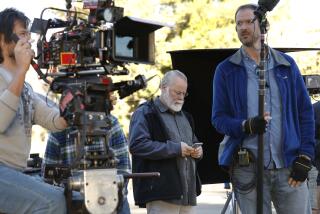Is Hollywood’s summer slump finally coming to an end?
Godzilla couldn’t do it. Spidey couldn’t do it. Tom Cruise couldn’t do it. In the end, history may show that it took the combined forces of a gun-toting space raccoon, a talking tree and four crime-fighting turtles to finally break Hollywood’s Great Summer Slump of 2014.
Since early May, the box office news has been almost unremittingly grim. While the film business entered the vitally important summer movie season running 9% ahead of 2013 thanks to hits like “The Lego Movie” and “Captain America: The Winter Soldier,” just when Hollywood should have been kicking into a higher gear, the industry seemed to blow a gasket.
With a few notable exceptions like the comedies “Neighbors” and “22 Jump Street,” a series of high-profile tent-pole movies either experienced steep drop-offs after promising openings (“The Amazing Spider-Man 2,” “Godzilla”) or failed to connect with U.S. audiences entirely (“The Edge of Tomorrow,” “A Million Ways to Die in the West”).
By late July, Hollywood’s healthy head start had been entirely wiped away and overall grosses for the year were running a whopping 20% behind last year. On studio lots across Los Angeles, hands were being wrung, sweat was being mopped from brows and at least one high-ranking executive, long-serving Sony Pictures distribution chief Jeff Blake, was shown the door.
Now, following the impressive debuts of Marvel’s “Guardians of the Galaxy” and Paramount’s “Teenage Mutant Ninja Turtles,” there’s a sense, or at least a hope, that Hollywood may finally be getting its mojo back. “Guardians” marked the highest-ever opening for an August release with $94 million, while “Turtles” cowabunga-ed expectations by pulling in a strong $65 million in its first weekend.
With these back-to-back hits -- which follow on the heels of strong performances for the simian sequel “Dawn of the Planet of the Apes” and the Scarlett Johansson action film “Lucy” -- Hollywood seems to be pulling out of its protracted tailspin. In the last two weeks, the year-to-year deficit has been cut from 20% back to 16.5%, hardly cause for a ticker-tape parade but certainly a step in the right direction.
You might not think that an industry as large as Hollywood could go through collective hot and cold streaks like a major league batter or an NBA free-throw shooter, but to a surprising extent, movies’ fortunes are tied to one another. A giant flop can spread its stink throughout the multiplexes, driving audiences back to their TVs, tablets and video-game consoles for entertainment, while a buzzy hit like “Guardians” can ignite greater excitement around the idea of heading to the movies on a Friday or Saturday night, pulling other films along on its coattails.
“When people go to the movies, they go to more movies, so it’s important that a lot of movies work,” Megan Colligan, Paramount’s president of domestic marketing and distribution, said in the wake of the big opening weekend for “Turtles.” “It’s a good thing for the business.”
In the summer, with so many eyes trained squarely on the box office, this contagion effect can be magnified. “As an ecosystem, the summer is very small,” said Paul Dergarabedian, senior media analyst for the entertainment data firm Rentrak. “It’s only 18 weeks, so two or three weeks in either direction can have a pretty profound effect not just on the box office or the percentages but, more importantly, on the vibe, the perception, the emotional response, if you will, to the summer.”
It’s too early to say for certain whether Hollywood’s luck really has turned, but if upcoming releases like the comedy “Let’s Be Cops” and the action sequel “The Expendables 3” continue to overperform like “Guardians” and “Turtles,” the industry will certainly start breathing easier. “Two up weekends in a row is a big deal this summer,” Dergarabedian said. “It’s a nice change, and I’m hoping that by the time we get to Labor Day, the deficit will be closer to 10 or 12%.”
Either way, the summer of 2014 is not one that Hollywood is likely to remember with much fondness. But just as in the sports world, the film business can still fall back on the time-honored mantra of beleaguered teams everywhere: There’s always next year.
Follow Josh Rottenberg on Twitter: @joshrottenberg
More to Read
Only good movies
Get the Indie Focus newsletter, Mark Olsen's weekly guide to the world of cinema.
You may occasionally receive promotional content from the Los Angeles Times.







